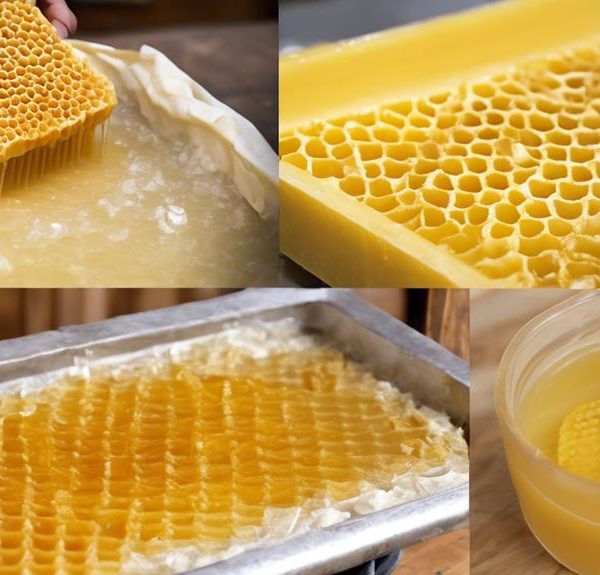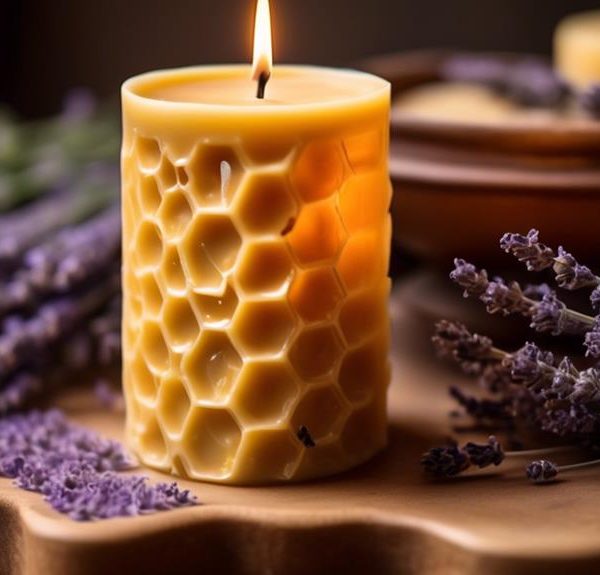Uncover the surprising truth about bees infiltrating your home through vents, and learn how to prevent this unexpected invasion.
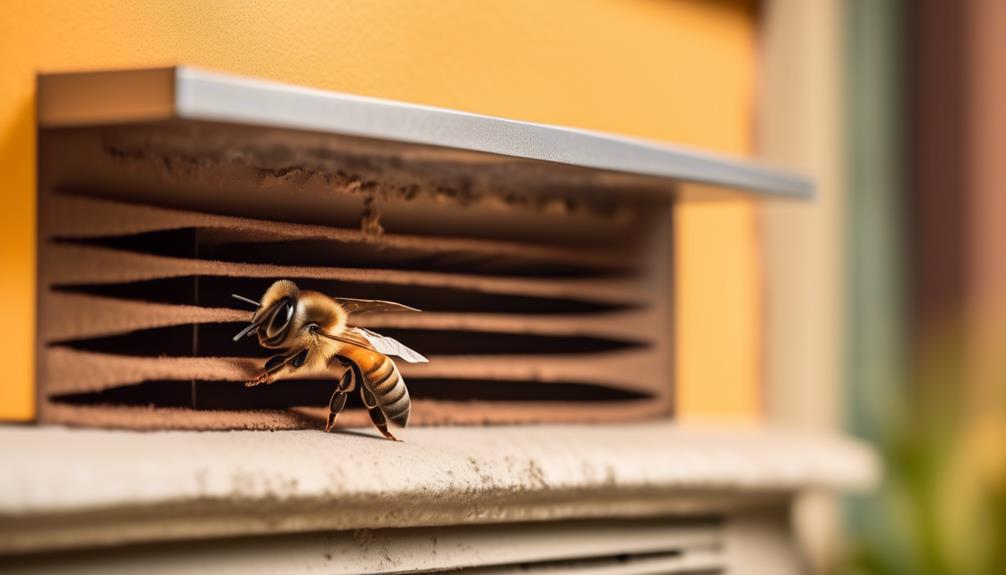
Can Bees Come Through Vents?
Like a thief in the night, bees may find their way into your home through the most unsuspecting entrances, such as vents. You're probably wondering, can these buzzing creatures really navigate their way through the winding pathways of your HVAC system?
It's a peculiar thought, isn't it? While it may seem like a plot straight out of a quirky wildlife documentary, it's a more common occurrence than you might think.
So, why don't we take a closer look at the intriguing mechanics of this phenomenon, and perhaps, how you can prevent these uninvited guests from making your vents their new home.
Key Takeaways
- Bees have exceptional navigation skills and can enter vents if they are not properly sealed or covered.
- Bees prefer dark, secure, and sheltered locations, making vents appealing for establishing colonies.
- Bees in vents can cause damage to ventilation systems and create unpleasant odors and potential health hazards.
- Professional help should be sought for safe and effective removal of bee infestations.
Understanding Bee Behaviour and Habits

To fully grasp why bees might venture through your vents, it's essential to first understand their behaviour and habits. Bees, specifically honeybees, are eusocial insects, which means they live in highly organized colonies. Each colony is made up of a queen, drones, and worker bees. The queen's sole role is to lay eggs, while the drones' main job is to mate with the queen. The worker bees, on the other hand, are responsible for gathering nectar and pollen, making honey, and defending the hive.
Now, let's consider why bees might find your home appealing. The first thing to note is that bees are always in search of new locations to establish their colonies. Bees prefer dark, secure, and sheltered locations, and your home's vents might provide the perfect environment. If your vents have openings, bees can easily enter and set up their new home.
The lifespan of a bee colony can vary, but once established, they tend to stay in the same location. This means that if bees have invaded your vents, they're likely to stay there unless you take steps to remove them.
Mechanism of Bees Entering Vents
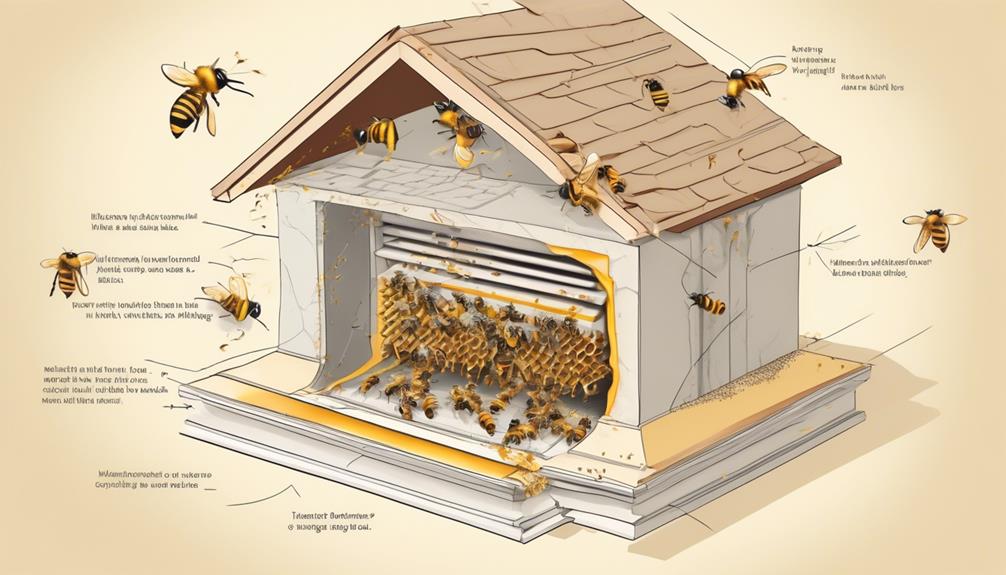
Understanding how bees infiltrate your vents requires a closer look at their problem-solving abilities and flight patterns. Bees, particularly honeybees, are known for their exceptional navigation skills. They're capable of flying several miles to forage and can still return home accurately.
But how do they get into your vents? It's not as complicated as you might think. Bees are attracted to the smell of flowers and other potential food sources. If your vents are near these attractions or if the scent can reach the vent, they'll investigate.
Their small size and flight agility allow them to navigate through the slats of your vent, especially if it's not properly sealed or covered. Once inside, they find it a suitable place to build a hive due to the protection it provides from predators and harsh weather conditions.
If you're noticing bees in your vents, it's likely an entire colony has set up home within. This isn't something you should ignore. Bees can cause significant damage to your vent system and pose a potential threat to those in your home who are allergic to bee stings.
Potential Dangers of Bees in Vents
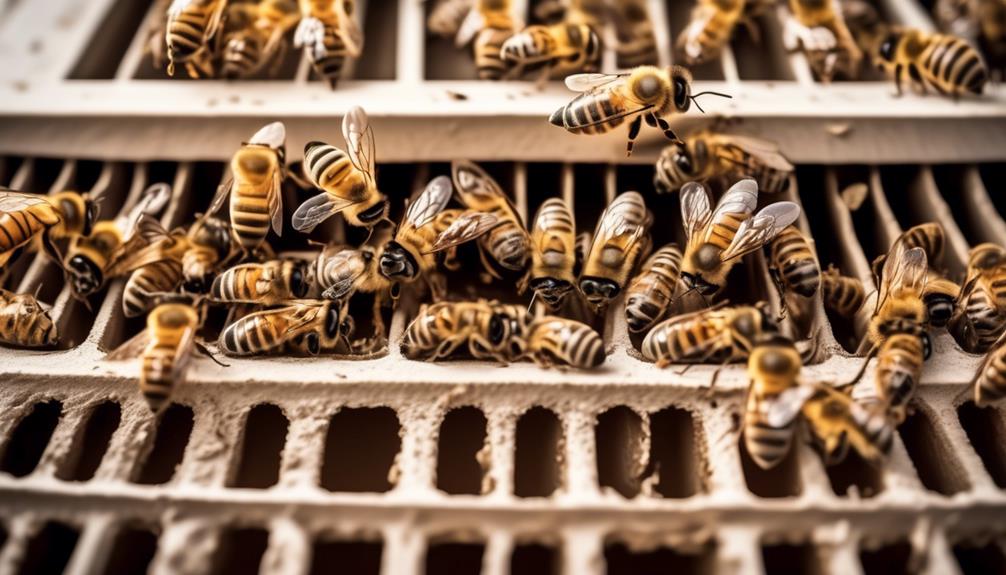
While you may not initially perceive them as a threat, bees nesting in your vents can pose serious risks, both structurally and health-wise. Over time, the bees' hive, made from a mixture of wax and propolis, can significantly damage your ventilation system. This weighty, sticky substance can obstruct the airflow, leading to inefficient heating or cooling, and even causing mechanical failure.
Moreover, the accumulation of dead bees and hive debris can lead to unpleasant odors and potential health hazards. The rotting organic matter can foster the growth of harmful molds, posing a risk to those with respiratory issues.
In terms of health risks, individuals with bee allergies face potential danger from bee stings if the insects infiltrate the living spaces. Even if you're not allergic, bee stings can still cause pain and discomfort. The presence of bees also raises the risk of anaphylaxis, a potentially life-threatening allergic reaction.
Tips for Bee-Proofing Your Vents
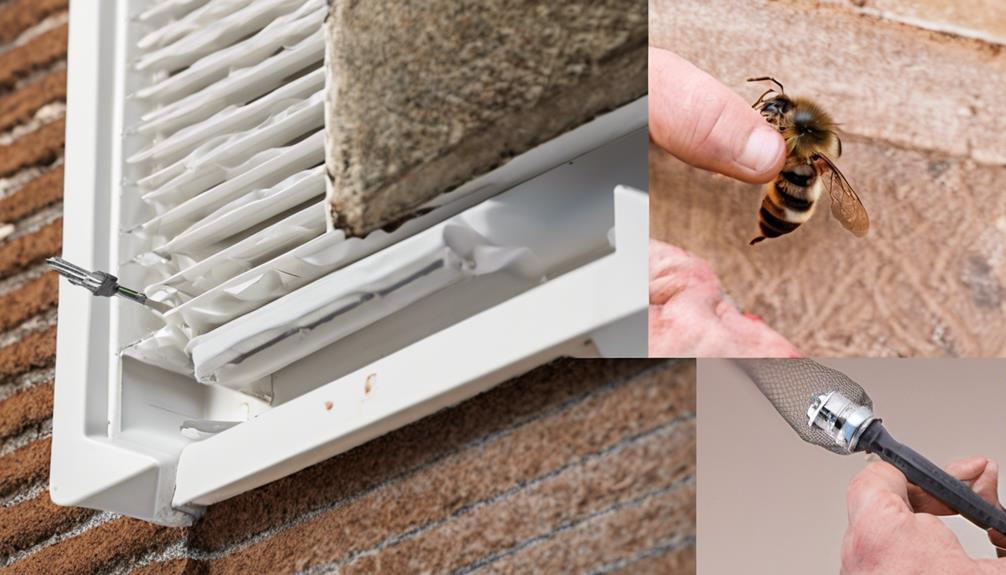
Given the potential dangers of having bees in your vents, it's crucial to implement preventive measures to deter these insects from making their home in your ventilation system.
Start by inspecting your vents routinely for any signs of bee activity. Look for bees flying in and out of the vent openings or listen for buzzing sounds. If you spot bees, avoid blocking the vent immediately as this might trap them inside, leading to more complications.
Next, consider installing mesh screens over your vents. These screens, with a maximum hole size of 1/8 inch, can effectively prevent bees from entering while allowing for proper airflow. Make sure the screens are securely attached and regularly check them for any damage or gaps that bees could exploit.
Further, seal any cracks or holes around your vents using a suitable sealant. Bees are adept at finding small openings to establish their hives. Regular maintenance of the vent system helps to eliminate such opportunities.
Lastly, if you're dealing with a severe bee infestation, it's advisable to seek professional help. Pest control experts have the necessary tools and knowledge to safely remove bees from your vents without causing harm to you or the bees.
Professional Solutions for Bee Infestations

If you're grappling with a persistent bee infestation in your vents, it's time to consider professional pest control solutions. These experts employ strategies honed by rigorous scientific research and extensive field experience. They're adept at identifying the species of the bees, an essential step as different species require different removal tactics.
Extermination isn't always the best route, particularly with honeybees, which are vital to the ecosystem. Pest control professionals often use a method known as live removal, which involves luring the bees into a new hive using pheromones. They may also use specialized vacuums to gently extract the bees.
Regardless of the method used, safety is paramount. Professionals wear protective gear to prevent bee stings, and they ensure the full removal of the hive and honeycomb. Failure to do so can attract other pests or cause structural damage due to melting wax.
Lastly, pest control specialists can provide preventative measures, sealing off potential entry points and advising on modifications to your home environment to discourage future bee infestations. Thus, investing in professional help not only solves your current issue but may also prevent future problems.
Frequently Asked Questions
What Specific Types of Bees Are Most Likely to Enter Home Vents?
Honeybees and bumblebees are most likely to enter your home vents. Honeybees often seek cavities for their hives and vents can be an ideal spot.
Bumblebees, on the other hand, typically nest in burrows and can mistake vents for burrows.
It's essential to prevent their entry because they might establish colonies, which can be difficult to remove and could potentially cause structural damage.
Are There Certain Times of the Year When Bees Are More Likely to Invade Home Vents?
Yes, there are certain times during the year when bees might be more prone to invade your home vents. Typically, this happens in the spring and summer when bees are most active. They're scouting for new locations to establish colonies, and your home vents can provide the shelter they need.
However, it can also occur in the fall when bees are looking for warm places to overwinter. So, you're not entirely safe any time of the year.
Can Bees Cause Damage to the Vent System Itself?
Yes, bees can cause damage to your vent system. When they build their hives, they use a substance called propolis. It's a sticky, resinous material that can gum up the workings of your vents.
Additionally, the weight of a large hive might strain or even crack parts of the system. If the bees die off, the leftover honey could drip and cause further issues.
It's always best to prevent or promptly address a bee infestation.
Are There Any Legal Restrictions on Removing Bees From Vents, Especially if They Are a Protected Species?
Yes, there are indeed legal restrictions on removing bees, especially if they're protected species. You can't just evict them willy-nilly.
In many areas, you're required to call in a professional beekeeper or a pest control expert who's trained to handle bees. They'll safely remove the hive, preserving the bees whenever possible.
It's crucial to protect these pollinators, and that's why these laws exist.
Can the Presence of Bees in Vents Attract Other Pests Into the Home?
Yes, bees in your vents can attract other pests.
Bees produce honey, which can lure pests like ants and roaches. They also create hive material which certain insects might use.
Additionally, dead bees may draw scavengers.
It's vital to safely remove the bees and thoroughly clean the area to prevent any infestation. You might need to consult professionals to ensure all traces of the hive and bees are eliminated.
Conclusion
Yes, bees can indeed infiltrate your vents, driven by their instinctive habits. This situation poses potential dangers, from stings to structural damage. You can prevent bee invasion by bee-proofing your vents and maintaining regular inspections.
However, if an infestation occurs, professional intervention is highly recommended. Understanding bee behaviour and acting proactively is your best defense against these industrious insects making your home their hive.

